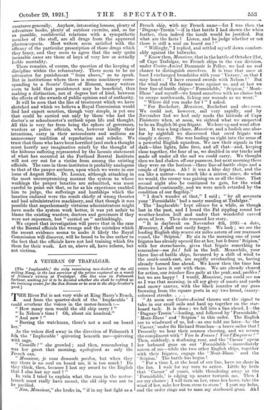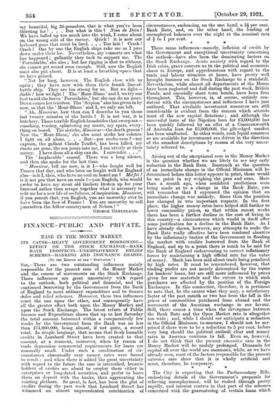A VETERAN OF TRAFALGAR.
[The Implacable,' the only remaining two-decker of the old sailing Navy, is the last survivor of the prizes captured as a result of Nelson's victory at Trafalgar. She lies now in Falmouth harbour, wailing Jor it to be decided whether she shall be refitted as the training centre for the Sea Scouts or be sent to the ship-breaker's yard.]
rHE River Fal is not very wide at King Harry's Reach, and from the quarter-deck of the ' Implacable ' I could overhear the voices in the motor-launch :— " How many men would the old ship carry ? "
" In Nelson's time ? Oh, about six hundred."
" And now ? "
" Barring the watchman, there's not a soul on board her."
As the voices died away in the direction of Falmouth I felt the `Implacable' quivering beneath me—quivering with rage. " Canaille ! " she growled ; and then, remembering I was her guest that morning, apologized as only the French can.
" Monsieur, je vous demande pardon, but when they say there is no soul on board me, it is too much ! Do they think, then, because I lost my sword to the English that I also lost my soul ? " In vain I tried to explain what the man in the motor- launch must really have meant, the old ship was not to be pacified. "Non, Monsieur," she broke in, " if in my last fight as a French ship, with my French name—for I was then the Duguay-Trouin '—if in that battle I had shown the white feather, then indeed the insult would be justified. But what are the facts I Listen, and be judge whether or not there is still a soul on board me ! "
" Willingly," I replied, and settled myself down comfort- ably against the bulwarks.
Know then, Monsieur, that in the battle of October 21st, off Cape Trafalgar, we French ships in the van division, under Contre-Amiral Dumanoir to Pelley, we had no real chance to distinguish ourselves. It is true that once at least I exchanged broadsides with your Victory,' so that I may boast : I have crossed swords with Nelson I ' But the wind and the fortune were against us, and at last we four line-of-battle ships—' Formidable,' Scipion," Mont- Blanc' and myself—we found ourselves with no choice but to escape northwards, licking our wounds as we went." " Where did you make for ? " I asked.
" For Rochefort, Monsieur, Rochefort and chez-nous. We could not, however, sail very rapidly, and by November 2nd we had only made the latitude of Cape Finisterre when, at noon, we sighted what we suspected to be an English 36-gun frigate. We bore up and went after her. It was a long chase, Monsieur, and a foolish one also• for by nightfall we discovered that sacre frigate was simply a decoy. She was leading us right into the arms of a powerful English squadron. We saw their signals in the dark—blue lights, false fires, and all that—and, keeping close together, the four of us, we doubled in our tracks and made off under all the sail we could carry. We thought then we had shaken off our pursuers, but next morning there they were on the horizon—three line-of-battle ships and a couple of frigates. Ah ! it was a blue day that, and the sea like a mirror—too much like a mirror, since, do what we would, the enemy was gaining on us all the time. That second night also he continued to gain, for the wind. fluctuated continually, and we were much retarded by the condition of our flagship." " I don't wonder at that," I said ; " by all accounts your Formidable' had a nasty mauling at Trafalgar." The Implacable' kept silence for a while, as though lost in the past, and I heard the Fal rippling round her weather-beaten hull and under that wonderful carved. stern of hers. Then she resumed her story. " It is daybreak on November 4th, 1805—a date, Monsieur, I shall not easily forget. Wo look ; we see the leading English ship scarce six miles astern of our rearmost vessel, the Scipion.' By six in the morning one of your frigates has already opened fire at her, but is brave' Scipion,' with her sternchasers, gives that frigate something to remember—via foil full in the hull. Meanwhile, your three line-of-battle ships, favoured by a shift of wind to the south-south-east, are rapidly overhauling us, having already formed line ahead. We know then the time has come to have it out with them. We are already cleared for action, our tricolore flies gaily at the peak, and, parbleu ! but we are happy ! I would, Monsieur, you could see me as I was that morning, in all my glory of masts and yards and snowy canvas, with the black muzzles of my guns frowning from the square ports in my two broad, canary- coloured streaks.. . .
" At noon our Contre-Amiral throws out the signal • to take in our small sails and haul up together on the star- board tack. It is done • we fall into a line ahead, I—the Duguay-Trouin '=leading, and followed by Formidable,' Mont-Blanc ' and Scipion ' in this order. The English are to windward of us, led—as one told me later—by the Caesar,' under Sir Richard Strachan—a brave sailor that ! Presently we hear their seamen cheering, and we return the compliment with " Vine la France ! Vine Empereur ! " Then, suddenly, a deafening roar, and the Caesar ' opens her larboard guns on our Formidable '—immediately astern of me—while the two other English ships, together with their frigates, engage the Mont-Blanc and the Scipion.' The battle has begun ! " For a time I, at the head of our line, have no share in the fun. I wait for my turn to arrive. Little by little that Caesar' of yours, while thundering away at the Formidable,' is edging up nearer towards me. Then I see my chance ; I will turn on her, cross her bows, take the wind of her, rake her from stem to stern I I port my helm, and the order rings out to man my starboard guns. Ahl my beautiful, big 36-pounders,. that is, what you've been thirsting for ! . . . But: what is this 3- Nom de Dieu / We have lulled up too much into the wind:, I. come about on the wrong side of the enemy. Quick I it is now our larboard guns that must be. fired.. . . Too late ! Crash ! Crash I One by, one. the English ships rake me as I pass down under their lee. Nevertheless„ my consorts see what has happened ; gallantly they tack to support me. The ' Formidable,' she also:; but. her rigging is shot to ribbons; she cannot get round soon. enough. Still; now the English must also put about. It is at least a breathing-space that we have gained. " Not for long, however. The English close with us again ; they have now with them their. fourth line-of- battle ship. They are too strong for us. But we fight- diable how we fight.! The ' Mont-Blanc? and I, we-try our best to aid the brave ' Formidable,' but she can do no more. Down comes her tricolors. The Seipion' also has given in by now, so that the ' Mont-Blanc.' and I,.we- only are left.
" Ah, Monsieur, how then. can I describe to you those last twenty minutes of the battle ? It is not war„ it is butchery. Those terrible English. roadsides that sweep me— smashing, tearing, splintering. my masts, my spars, every- thing.on board. The shrieks, Monsieur—the death groana ! Now the `Mont-Blanc,' she also must strike her colours. I fight on. all alone. . . . But—que noulez-vows.?—my captain,. the gallant Claude. Touffet, has been killed, my masts are gone, the sea pours. into me, I am utterly at their mercy.. I have done all a ship can do. I surrender. . . ." The ' Implacable' ceased. There was a long silence, and then she spoke for. the last time. " Monsieur, tell me now,. is it I—who fought well for France that day, and who, later on fought well for. England also—is it I, then, who have no soul on board-me 'I Ma foi ! is it not you. that. have no- souls 1—you English who. would prefer to, have my stout old. timbers broken up for your firewood rather. than. scrape. together what is. necessary to refit me for a new life of usefulness, of inspiration. Monsieur, if. you permit that, you English, you are. unworthy ever to have been the foes- of France I You are unworthy to call yourseFees- the. fellow-countrymen of Nelson.! "
GEORGE GREENLAND.







































 Previous page
Previous page